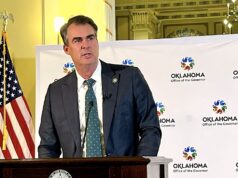Much discussion and controversy surround education in Oklahoma. Differing needs for urban and rural schools, a changing economy, and a lagging state budget have strained our education system. Innovation and productivity provide the answer, but applying the formula won’t be easy.
A blast from the past
Promising technology often gets off to a slow start. At the turn of the 20th century, many factories had a large steam engine powering their machines. New inventions of electricity and electric motors eventually replaced the steam engines, giving small boosts to productivity. A generation later, visionaries like Henry Ford realized that instead of organizing factories around a single electric motor, many smaller motors could be used and the factory floor could be reorganized as production flowed. This became known as the assembly line.
Innovation in education is nearing a similar moment. While computers and technology provide the most promise for improving education, their impact so far has been disappointing. Only a few education innovators have managed to crack the code, while others have tried to add “tech” to their existing paradigm. Those who have experienced “digital” classrooms probably are familiar with how this works: Sitting in the back row of a class means seeing many more screens of Facebook than note taking.
Reorganizing the education model
Whether they are from Laurene Powell Jobs or the Oklahoma School Public Resource Center, new models that reorganize the idea of a classroom and school are being floated. OSPRC touts blended learning, an idea that uses technology to improve teacher productivity. If implemented properly, teacher-student ratios could be cut in half, while more customized lessons would improve learning. The traditional idea of a classroom disappears as students work at their own pace and form ad hoc groups with teachers to address specific needs. That would turn Oklahoma’s teacher shortage in a surplus, allowing the best teachers to shine while creating savings for better salaries.
Execution is the challenge
Anyone familiar with Healthcare.gov or Britain’s attempt at creating an integrated IT system for its health service is rightly skeptical of large government roll outs of technology. Many attempts at digitizing the classroom have been met with frustration and only enriched large education providers while providing little value to schools. Weak procurement programs and muddled objectives can lead to district-wide debacles in trying to implement technology.
As the lesson from Ford shows, the technology itself is not a silver bullet, but a tool that allows an efficient reorganization of processes. Many education leaders will struggle to grasp this and fight technology or continue to fall for a slick sales pitch. Oklahoma schools would be wise to watch closely how implementations across the country go and mind the small details. There is no shame in copying already-successful programs.
Charting the path
Education’s evolution will not be popular with everyone. Those who believe in the traditional model will resist ideas that erode historical school structures. Teachers unions will not appreciate having their corps shrunk by technology and will lead the Luddites. Other side effects, such as digital-native learning that allows constant monitoring and evaluation will excite data junkies, could eliminate standardized testing but irk those that disagree with quantitatively evaluating teachers or segmenting students based on ability and progress.
For those that are patient and grind it out like Mooresville Schools or Innovations Early College High School, the benefits are clear. Even in Clinton, reading software has been made available to the entire town at a low cost to help reduce early learning gaps before students start school. Technology like this can identify students that are behind before they even start pre-K.
The transition won’t be easy, especially for a creaky government institution like public education, but with a huge looming deficit and only potential relief in sight, what choice do we have?






















